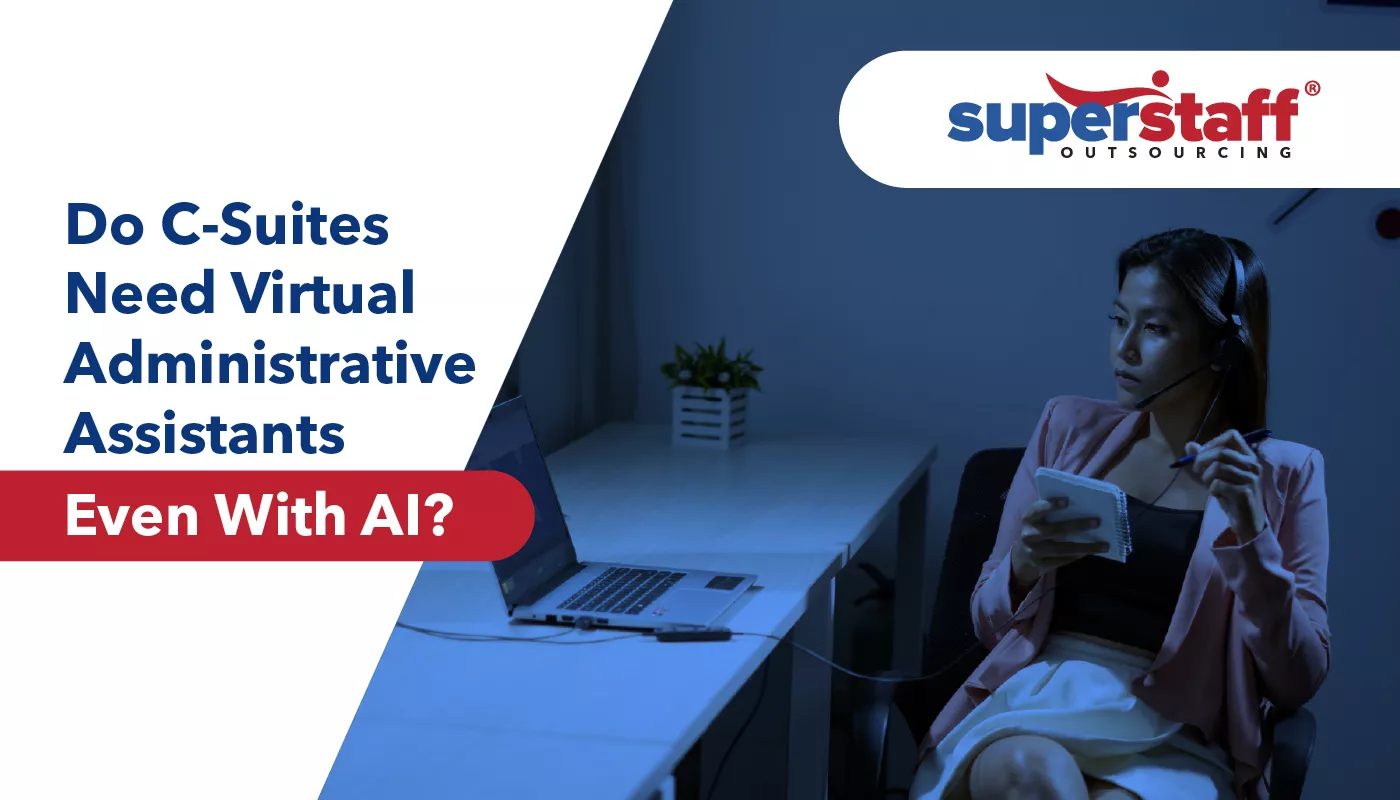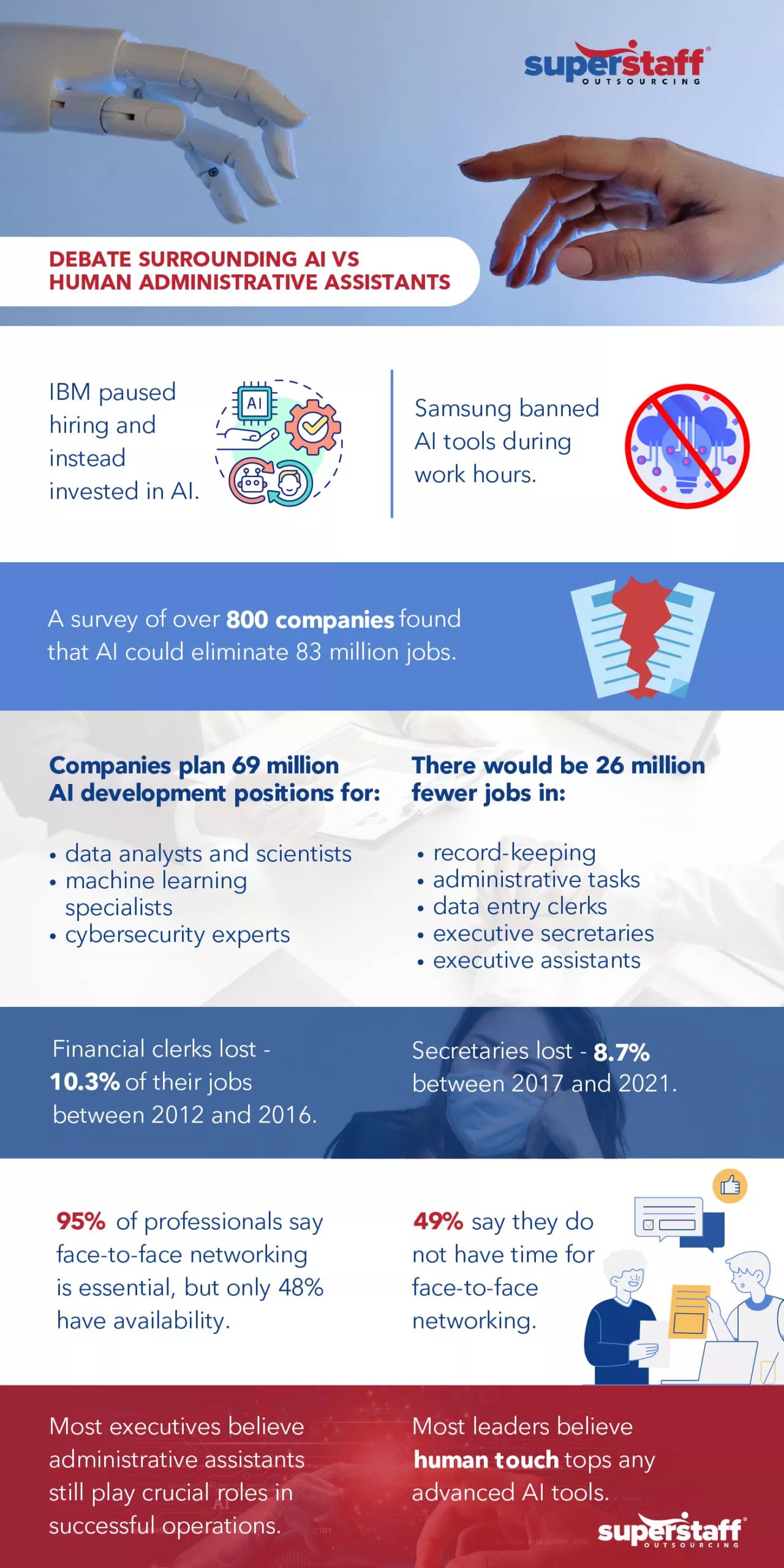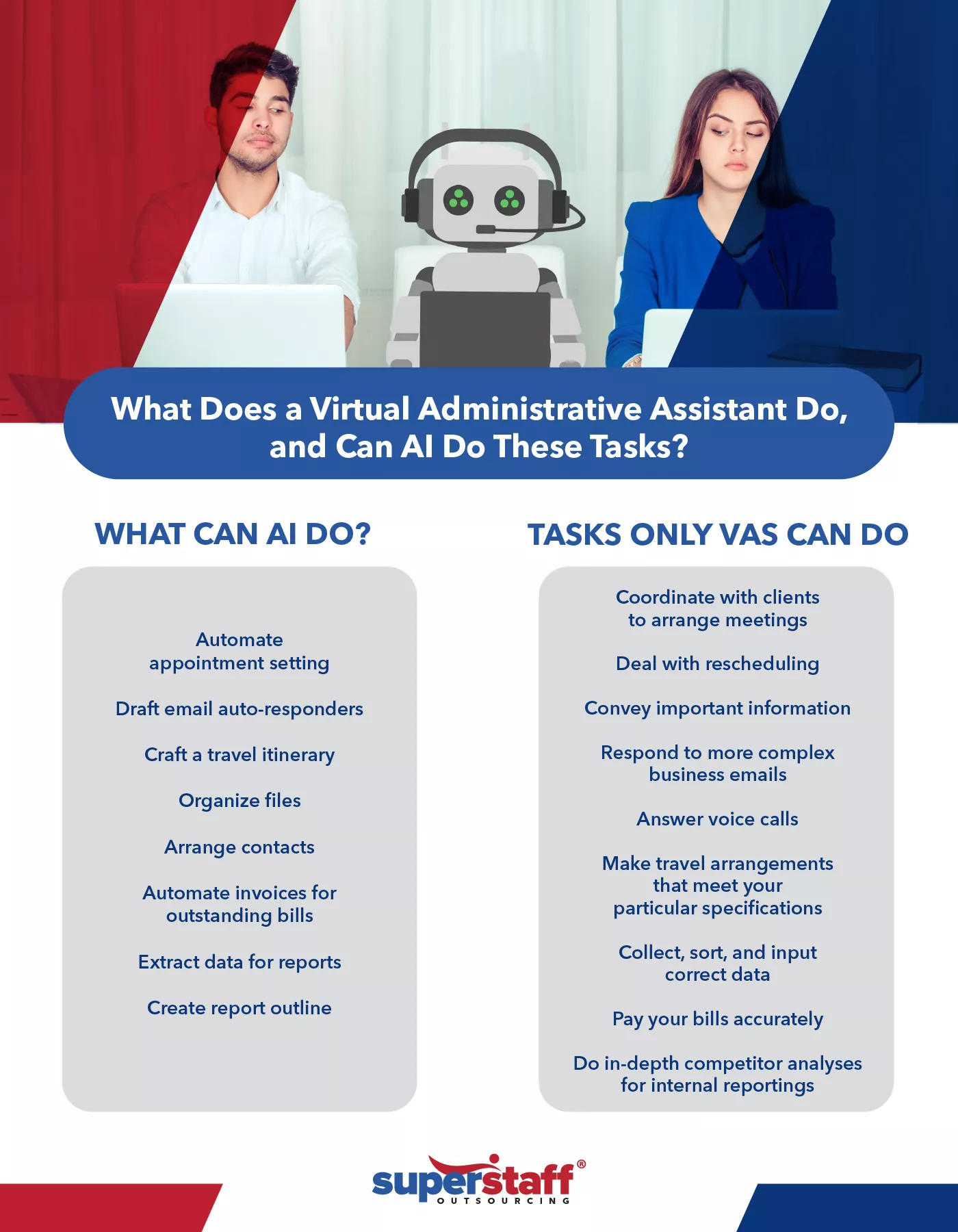
The truth is that even as businesses embrace AIs, human VAs are still the essential part of daily operations.
Artificial intelligence can automate some routine tasks, but AI is just a tool, and tools need human workers to deploy and utilize them.
The multinational tech giant IBM made headlines in May 2023 for its decision to pause hiring new workers and instead invest in artificial intelligence. In a Bloomberg interview, Arvind Krishna, the CEO of IBM, explained that they would halt recruitment for positions that AI could replace, specifically back-office roles like secretaries and virtual administrative assistants.
In IBM, about 26,000 employees work in these administrative or support roles, and Krishna explained that artificial intelligence might replace 30% (or approximately 7,800 people). The shift would affect about 3% of the company’s total workforce.
He reiterated that the transition wouldn’t be immediate but would happen gradually. Handling employment verification letters or transferring employees between departments are functions he believed AI could automate.
In late January, IBM had already cut down on 3,900 jobs, independent of the decision to reduce roles due to AI. However, the upcoming hiring freeze and expected attrition will likely affect more back-office workers.
This move generated endless conversations and debates among business owners and other key decision-makers in the United States, with many seeing AI as a replacement for human workers. In contrast, others thought about banning the technology entirely.
The famous consumer electronics manufacturer Samsung is one example of a company that made the opposite of IBM’s decision. In late April, the company announced a new employee policy that banned the use of generative AI tools during work hours.
In their company memo, Samsung outlined concerns about sharing information with AI platforms, explaining that Bing Chat and Google Bard stored data on external servers, which could potentially compromise security and confidentiality. They argue that AI cannot yet be trusted with the sensitive information that many human employees, including VAs, handle daily.
As the buzz around AI grows, many business leaders may wonder, “Do I even need to hire a virtual assistant, or would it be a better move to just invest in AI as early as today?”

In the Era of AI, Where Does the Average Administrative Virtual Assistant Fit?
According to the 2023 World Economic Forum, which hosts a gathering of global leaders every year, AI will likely displace many jobs. As the economy weakens and more companies rush to implement artificial intelligence into their operations, the global job market will face significant disruptions over the next five years.
In a survey of over 800 companies, the researchers found that employers expect to reduce 83 million job positions due to AI, resulting in a 14 million net loss or 2% of total current employment. At the same time, companies plan to create 69 million new positions.
And what occupations are most at risk of being replaced by artificial intelligence, according to industry experts? The WEF predicted there would be 26 million fewer jobs dealing with record-keeping and administrative tasks, including data entry clerks, executive secretaries, and assistant jobs.
Virtual assistants, in particular, are seen as being at risk because they perform various administrative support functions while working from home or from a remote location, including dealing with data entry, scheduling, and answering client calls.
WEF’s predictions have already started coming to fruition as early as today. A recent report illustrated the rapid decline in employment for all clerical and administrative work, with over 2 million employment lost between 2016 and 2021. Financial clerks lost -10.3% of jobs between 2012 and 2016, while secretaries lost -8.7% between 2017 and 2021.
Many business leaders saw these functions as replaceable because, in their eyes, they could be automated through the use of integrated calendar systems and office management software.
Looking at these studies, many C-suites may wonder whether there is still a need for human VAs in the age of AI–and this is what we’re here to uncover.
The truth is that even as businesses embrace digital transformation, human VAs are still an essential part of many companies’ daily operations.
Why? Virtual assistants help C-suites save one valuable resource: time.
What Does a Virtual Administrative Assistant Do, and Can AI Do These Tasks?
As a business leader and executive, you already have a wealth of important work to do daily. If you have enough time out of your hectic schedule to learn how to use AI tools and juggle them on top of your existing responsibilities, delegating these functions to a reliable administrative assistant is still your best bet.
Artificial intelligence can automate some routine tasks, but AI is just a tool. And tools need human workers to deploy and utilize them.
Here’s the truth: AI cannot fully replace human virtual assistants. Instead, human VAs can use AI software to handle the functions you need to perform more efficiently.
Let’s take a look at some of the tasks that VAs do daily:

Scheduling and Calendar Management
Picture this: You’re a busy executive and must schedule a meeting with a very important client. First, you’ll have to email them, setting a time and date for your appointment.
They could take a few hours or days to respond, saying your schedule may not work for them. So, they emailed you a different plan, but after checking your calendar, you realize it’s a date and time that doesn’t work for you.
This email back-and-forth goes on for a few more tries. As this goes on, you deal with numerous reschedules and cancellations from other important people.
If even one of those meetings fails to arrive at the appointed time, you’ll have to start the process again.
Imagine that it takes you 20 minutes to schedule a meeting, and multiply those 20 minutes across a few sessions per day. You’ll realize that you’ve already spent a lot of wasted time on a routine task.
Of course, you could speed up the process by using AI tools, such as calendar management software, to automate some functions and make changes and updates to your schedule more easily.
However, you will still need to talk to your clients, colleagues, and fellow executives to arrange meetings, deal with rescheduling, and pass on important information. These simple yet crucial tasks will still require a human virtual assistant.
Responding to Emails and Phone Calls
Did you know that many C-suites can spend up to three hours a day just responding to emails and voicemail messages?
Although it seems a reasonably simple task, it can get repetitive to constantly filter out unimportant messages from many emails or stop whatever you do every time the phone rings. If you always have to interrupt your train of thought to respond to a new message, you often struggle to re-focus on the task.
Instead of dealing with this for hours, you can focus your time and energy on your core business functions if you delegate this task to a reliable virtual administrative assistant.
Why would you need a virtual assistant for this task? As of this writing, AI needs to be more advanced to answer voice calls.
As for answering emails, AI tools can only write generic replies, which can help answer simple questions but won’t be beneficial for navigating more complex business emails. Your virtual assistant can also respond to any messages you may get on critical social media platforms like LinkedIn.
Planning and Booking Travel for Business
The average business trip can take about 12 hours (or more) to plan.
You spend so much time looking at different flight times and layovers. Then, you have to check hotel availability and prices and arrange logistics and transportation. If even a single itinerary doesn’t work, you’ll have to start from scratch.
Once you’ve booked the trip, you’ll have to arrange meetings at your chosen destination, choose from different high-end restaurants, and make reservations for yourself and your guests.
Traveling also often involves a lot of paperwork and documentation, especially for international flights.
All of these challenges combined can take a toll on any business executive. Thankfully, making travel arrangements that meet your particular needs and specifications is one of the things the right virtual assistant can perform efficiently and effectively.
AI can be ideal for crafting a travel itinerary or helping you look up hotel availability and prices. However, a human VA will still be necessary for booking everything, from your flights to your accommodation and transportation.
Professional Networking
For executives, professional networking is a must for retaining important business contacts and relationships. However, because of the busy schedules of many C-suites, most do not have the time to keep up with their network.
Studies have found that most professionals (95%) consider face-to-face networking essential for cultivating good business relationships. However, only 48% stay in touch with their professional contacts, and 49% say it’s because they do not have enough time for networking.
Helping you manage your professional network is something you cannot entrust an AI to do on its own. This task requires a human touch, and a suitable VA can help you stay connected to your contacts while helping you get in touch with new opportunities.
Your virtual executive assistant can keep your contacts in a well-organized database. They can schedule regular calls or appointments with your most critical connections to ensure you have time for your network.
As you focus on your core business, a VA can also research any upcoming networking events so that you can schedule these into your calendar.
What Will the Future Look Like for C-Suites in 2023 and Beyond?
Navigate the Delicate Balancing Act of Short-Term and Long-Term Planning
Although long-term planning has always been a core component of business, many companies have had to significantly alter their strategies after the disruptions brought on by the COVID-19 pandemic, from supply chain challenges to “The Great Resignation.”
The last few years have taught many executives to prioritize short-term planning as a response to the uncertainty of today’s global economic environment. However, the problem is that focusing on quick wins without looking to the future can hinder progress and business growth in the long run.
The challenge for C-suite leaders is to carefully balance their short-term and long-term planning as they navigate these uncharted waters.
One example is Disney’s recent decision to significantly increase admission prices for their theme parks and vacation clubs. Loyal fans, who were once willing to spend their holidays going on Disney rides and themed attractions, accused the company of price gouging and decided to take their business elsewhere.
Although the decision to raise prices gave the company a quick win, its brand reputation took a big hit, especially among consumers still reeling from the economic effects of COVID-19. Time will tell whether the brand can quickly bounce back from this hurdle or if the decision has slowed the company’s long-term progress and profitability.
The same is true for the artificial intelligence debate. Many business leaders make rash decisions by laying off their human employees in favor of AI.
Although this may satisfy the short-term goal of reducing labor costs, this decision may haunt companies in the long run by potentially damaging their reputation among job seekers, leading qualified workers, even those with niche and specialized skills, to avoid applying for them.
At the same time, the decision to prioritize AI over human capital may lower the morale of their existing employees and affect the quality and efficiency of their daily operations, given that AI still needs to be fully reliable as a replacement for human workers.
Explore Alternative Ways to Cut Down on Costs While Optimizing Productivity
Before the pandemic, prioritizing growth over profitability was a strategy that many businesses were willing to implement, with many finding ample investors willing to finance risky investments with the promise of future profit opportunities.
However, this soon ended at the height of the COVID-19 crisis as many businesses struggled to stay financially afloat. Inflation and continually rising interest rates are causing investors to pressure companies into staying on “safe” paths that lead to maximum profitability.
In the post-pandemic world, companies have begun cutting costs to achieve profitability and sustainable growth. Many leaders and decision-makers see technology, data, and analytics as crucial components of their new strategy.
A 2023 Greenhouse study surveyed 300 US-based CEOs and found that most executives are optimistic about their businesses’ economy and future. Still, they want to continue looking for ways to reduce costs.
In the currently volatile economic climate, companies must decide to tighten their belts to protect future growth.
However, the same study highlighted that CEOs view their human capital as their greatest asset. As much as possible, business leaders wish to avoid layoffs and look into every other course of action before even considering letting employees go.
Outsourcing can be an excellent strategic option for businesses looking to cut down on costs without sacrificing the productivity of their workforce. Lighten the workload of your core team by delegating administrative and support functions to offshore professionals while also improving your bottom line.
Achieve Maximum Profitability and Productivity With Outsourced Virtual Admin Assistants
Executives must weigh the pros and cons of every decision before committing to any short-term or long-term business strategies. In the Age of Artificial Intelligence and Digital Transformation, it’s easy to forget that your workforce is still your company’s greatest asset.
Here at SuperStaff, we want to help businesses like yours achieve their fullest potential in the long run while keeping costs low and maintaining profitability.
We offer a wide range of outsourcing solutions, including various back-office services. With our team of outsourced virtual administrative assistants by your side, you can save time and money while focusing on your crucial business goals.
Contact us today, and learn more about what our outsourcing services can do for you!






